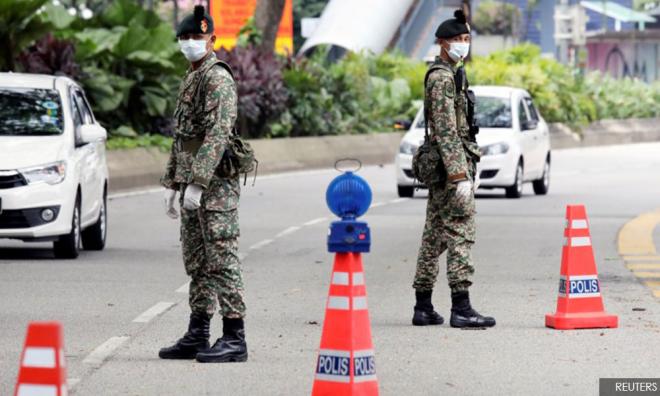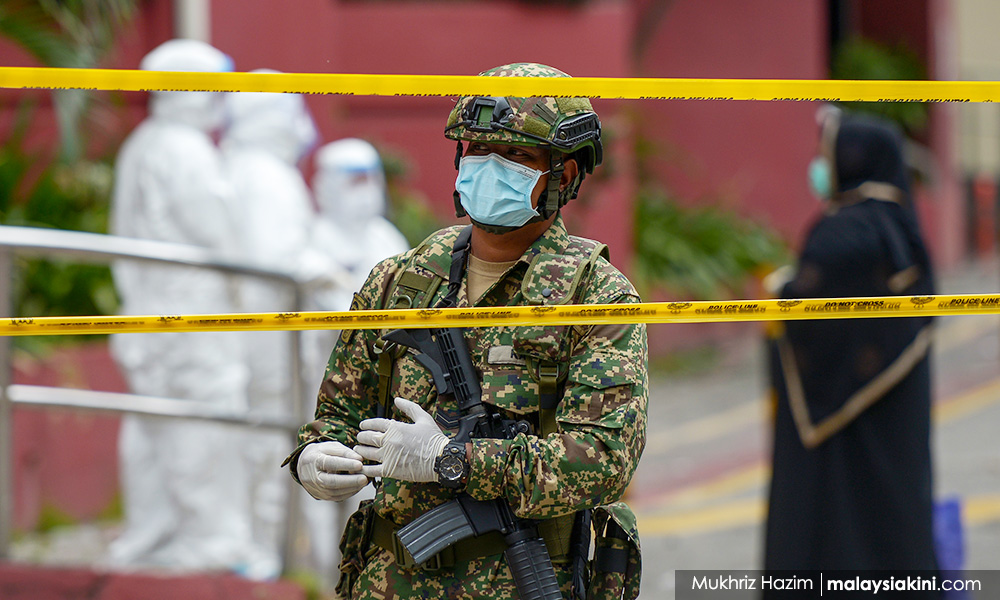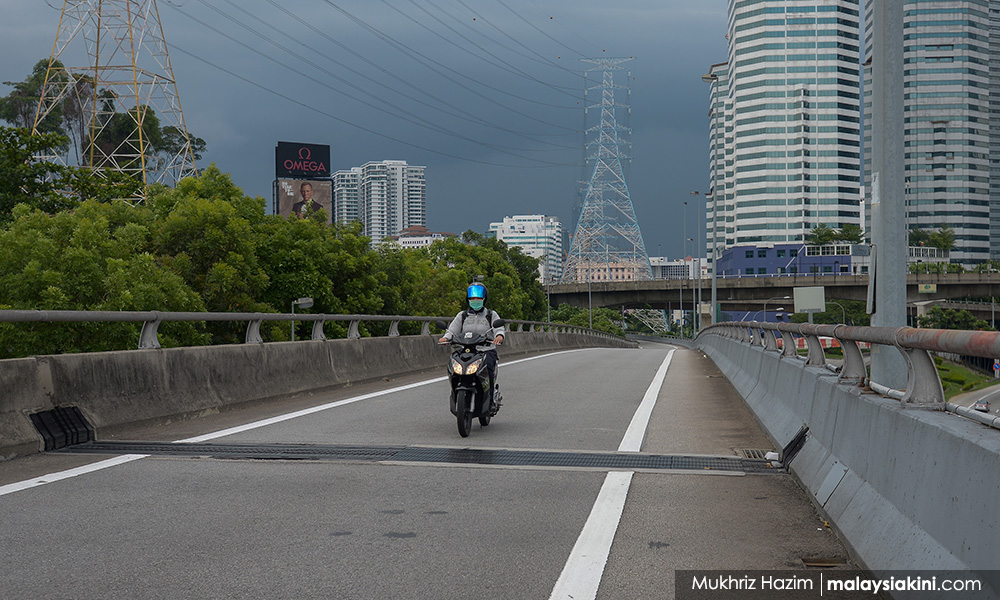
Published by Malay Mail, Malaysiakini & Sin Chew, images from Malaysiakini.
War involves the mobilisation of the entire country with the single objective of defeating an existential threat. The latter implies the sort of threat that can grind a country to a halt, creating a chain reaction of human miseries.
But the analogy to war should be used not only carefully but critically. First or all, war is a spectrum.
An actual war ranges from low intensity conflict or guerilla war all the way to a conventional, or, nuclear war.
In this context, Malaysia should be selective in the use — which could lead to abuse — of the concept of war. Words matter in a parliamentary democracy or a constitutional monarchy as the free use of the concept of war either empowers the Prime Minister Office to do what ever it wants, or just as badly, to induce a panic on how he and his team responds to the crisis of Covid 19.
There is no metric to understand the state of mind of the decision makers in Malaysia right. Are they in a strategic war mode, or are they reeling from utter fear?
The extension of the movement control order (MCO) from the end of March 31 to April 14 is not a scientific indicator since this is a sledgehammer approach.

Almost any government that wants to exert more and more authority on public policy issue can do it to relieve the daily pressures they feel as the number of Covid-19 cases begin to tick up or dip down without concurrently allowing more and more patients to recover.
A strategic war mode is when they know how to procure the necessary equipment to test, treat and trace the vectors of transmission; with the attendant ability to stabilise the economy again and again with the goal to stimulate it later.
That being said, there is no need to use the word war too loosely yet. Covid-19 is a pandemic, which can become an endemic too. It other words it is here to stay.
If the word “war” is deployed too early by Members of Parliament or any political parties, without understanding war in their myriad forms, then pressing on with the usage of war would be risky.
First, it allows nationalisation of the private sector, including various industries that are deemed helpful in the fight against Covid-19.
Spain, for example, has nationalised all its hospitals. While this is a good move, as the patients affected by Covid-19 has over whelmed their public health system, the same hasn’t happened to Malaysia yet.
It could happen to Malaysia but it hasn’t. Do note that JP Morgan expects the cases in Malaysia to peak in the middle of April 2020 by two times the number of the current cases; making it a total of 6000 cases and above.
Now, granted that war has to be fought by all patriots alike, citizens who know nothing about Covid-19, would be mobilised through sheer peer pressure to do something for Malaysia. This spirit of do something or derring-do would run-counter to the MCO.
Second, the rapid yet generic use of the word “war,” once again without any specific definition of what kind of war, Malaysian government and opposition alike may not necessarily unite for the better good.
One must remember the first casualty of war is truth. Is the opposition willing to tolerate the suppression of any medical facts or fatalities to keep the national spirit up?
Indeed Carl Von Clauwitz, author of the Magnus opus on “war,” warned time and again that war is easy to declare but difficult to fight.
An actual war will result in what he called “friction.” What is suppose to happen will be bogged down too. Often by mundane factors such a weather, soggy land conditions, mechanical issues, lack of understanding of real and fake information, if not more, to make the whole operation an even more complex affair.
Besides, when the language of war is invoked, no matter how soon, one is not necessarily guaranteed a victory, too, especially when the kind of war one with which one is waging has no known and visible enemy.
Let alone an enemy with a definitive mortality. Thus public and private hospitals should enhance their coordination. The metaphors of war should not be used as the policy tool to rally Malaysians.

As the fervour, for now, should be to ask, indeed demand Malaysians, to comply totally to the MCO. This is to stop more human traffic from perpetuating various vectors of transmission.
Third, let’s assume war is equated with “war time” production of various medical equipments. In other words, confined to enhanced and increased production of those necessary materials to help the front line medical workers only.
This phrase would have the unintended consequences of prioritising the fight against Covid 19 in the hospital wards, ICU units and quarantine centers. That doctors and nurses would be the front liners only not the whole society.
Such a scenario would lead to more pressures on doctors and nurses. As they alone would be expected to shoulder the responsibility of fighting Covid-19.
If anything, the private and public health workers would be thrown into a disarray. As over time, they would feel psychologically burdened to the extreme. That only they, and they alone, are expected to carry the physical and proverbial fight of the entire country.
Yet, Covid-19 requires all citizens to do the basic: wash their hands and keep to their social distances of at least two meters.
Besides, if the analogy of war has to be invoked anyway, then one should already begin the process to train the soldiers and their medical professionals to handle the Covid— 19 patients. Potentially, the deceased as well; in order to prevent further spread of the virus.
To be sure, no average citizen, when war is invoked, can be transformed over night from a manual office worker into a clinically qualified worker, let alone mortician; as the fear of death and pestilence would be too over whelming to bear.
Further more, there are strategic implications that go beyond Malaysia when the country uses the analogy of war in a callous manner. For example, war necessitates alliances when you are unable to win.
Since China appears to be winning the “war” against Covid 19, does Malaysia swing to China while the West is wobbling? And, if the answer is No, then why use the word war freely to tie the hands of our policy makers if not the prime minister?
A more sanguine approach to deal with Covid-19 is not to use the W word. Rather, one should go back to what Malaysia has been superb at in defeating the Communists, some of whom were lurking in the local communities unknown and unseen too, then.
Malaysia should focus on winning the hearts and minds of all citizens through a total campaign of getting them over to respect MCO but also to reassure them this will not be forever, indeed, to invite all stakeholders to regular dialogues on how they like to be helped through the roll out of various economic stimulus programmes as the country hunkers down to a potentially prolonged struggle with the ramifications of Covid-19.
Parliament, ideally, online, must still be convened on time on May 18. Hari Raya and Ramadan must be celebrated online for now.
By invoking war, and urging others to see it as war, even if the world is in a bad shape, is to lose that clarity of thought to ironically see through and beyond the “fog of war.”
War, when used in a wanton manner, forces everyone to fall back on their individualized survival strategies — especially when the war time leadership is lacking and lagging.
Instead of social distancing carefully, the specter of war forces each house hold to hoard on anything from food to toilet paper and masks, creating not merely price gouging but wide spread petty corruption all over the country, when essential goods are imported bought from outside the country.
These items can be intentionally held back at the customs and check points; triggering more head aches for the government.
Covid-19 is serious and a potential existential threat. There is no doubt about it. But Malaysia’s cases are still predominantly weighted on the cluster outbreak of the Tabligh movement or gathering between February 27 and March 1.
As of March 28 last week, 75 per cent of the cases appeared to have some links to the unfortunate gathering.
The focus should be on testing, treating and tracing them, and the contacts they have come in touch with. As this is written, 3000 of them are still abroad. Malaysians must carefully watch their eventual return.
Like it or not, the MCO can eventually flatten the curve, and prevent the waves of cases.
But if the pandemic of Covid-19 does become endemic, the Constitutional Monarchy and Parliamentary Democracy of Malaysia cannot be transformed into a war cabinet too.
A strong technocratic government is still needed to deal with the unseen threat of Covid-19 cases, albeit in different clusters; especially their dire economic implications that follow.
Some 1.2 million entities in Malaysia are Small and Medium Enterprises. They form the backbone of Malaysian economy. If the language of war is used, without helping them first, then Malaysia would be equally floored.
For now, one should assume that Covid-19 is here to stay until a vaccine is found in Malaysia or elsewhere in the next 18 months or longer.
This time frame is due to the complexity of finding a vaccine, of which over 50 groups of scientists under the observation of the World Health Organisation (WHO) are at work.
The rhetoric or language of war does sooth the feeling that one is taking Covid-19 seriously. That one is doing something, indeed, anything. But this is clearly a form of policy over-shoot.
Indeed, there is a cascade of implications that will undermine the institutional edifice of Malaysia, if not the social fabric of the country, since Covid 19 is largely, if not already blamed on the Tabligh movement; since most of the cases had been due to the massive gathering in the Sri Petaling Mosque on February 27-March 1.
In this context, inter racial and intra racial tensions can flare up. The latter within the Malay community who pins the blame on the Tabligh; as it is seen as the primary cause of the national misery afflicting the country.
As Confucius once said, one of the key rules of politics is to name things correctly. Covid-19 is a pandemic; which once again, one should repeat, can become endemic.
But the method to fight both manifestations must not necessarily carry a martial and military implication immediately.
If anything, as and when the army is needed at all, it must be transformed into a civilian based defense through cross training, where instead of handling their guns and other killing machines and defensive weapons, they must now be able to handle other medical equipments too, such as the defibrillators and ventilators.
Now, as they are being cross trained, our very own civilians must support the front liners and new breed of medical warriors too. What Malaysia needs is this form of patriotic spirit. Not the animalistic energy that is derived from the real or metaphorical declaration of war.
Patriotism, for instance, can come from the willingness to be cross trained at home too; beyond being told to wear their masks or wash their hands regularly.
Civilians can be taught and guided on how to handle the sick, or, even deceased by reaching out to the relevant authorities, such as the Ministry of Health, or, dedicated Covid-19 units in private hospitals.
War is a spectrum as mentioned earlier. MCO is a small step toward wrestling the virus to the ground.
But there are more civilian based measures that are needed for now.
The invocation of war takes the policy instruments of the Malaysian Government to the immediate extreme, when this virus requires a carefully calibrated yet cohesive response; with a stress on enhanced medical protocols; concise economic support to individuals and commercial entities alike; finally coordination with international development banks and agencies to augment Malaysian Incorporated.
Dr. Rais Hussin is President & CEO of EMIR Research, an independent think tank focused on strategic policy recommendations based on rigorous research.
.jpg)
